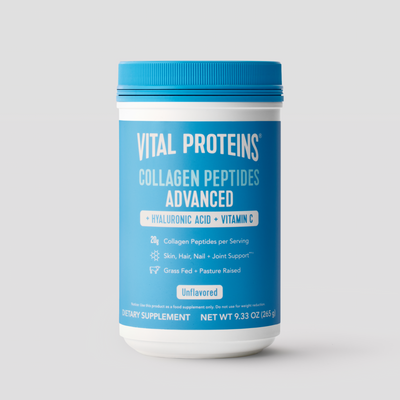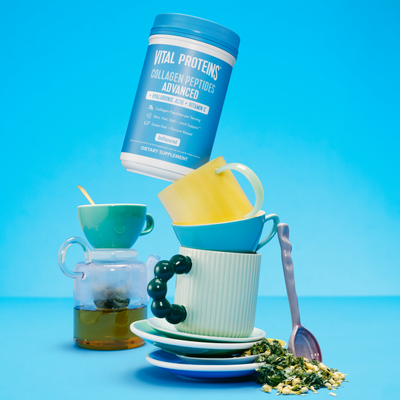The relationship between diet and exercise for health and longevity often comes with many questions. New research comes out all the time, with some headlines promoting diet and others emphasizing exercise as the best "new" way to stay healthy. Which can lead to some confusion. And while both are important, does one really matter more than the other for health? Here's what to know.
Vital Note: This article has been made available for informational and educational purposes only. It is not intended to be a substitute for professional medical advice, diagnosis, or treatment. Always seek the advice of your physician or another qualified health provider with any questions you may have regarding a medical condition. Your licensed healthcare professional can best provide you with the diagnosis and treatment of any medical condition and assist you as well in deciding whether a dietary supplement will be a helpful addition to your regimen.

The Importance of Diet
It's no surprise that diet is a huge contributor to your overall health. Yet, only one in 10 adults eat enough fruits and vegetables, according to theCenters for Disease Control and Prevention (CDC). If your diet is lacking these, that can spell trouble, because fruits, veggies and leafy greens provide many micronutrients (includingvitamins and minerals) essential for staying healthy.
Carbohydrates, proteins and fats and the three macronutrients important for a balanced lifestyle. And research has found that getting adequate amounts of protein and healthy fats are especially important for longevity. High protein intake minimizes muscle loss and the loss of bone mineral density,** according toresearch from the Institute of Medicine (U.S.) Food Forum.
The loss of lean mass can increase the risk of other metabolic imbalances (such as increased blood pressure and high blood sugar), chronic conditions (including heart disease and cancer) and the chance of falling—so supporting strong bones and joint health can be an overall preventative measure for nearly all demographics.
While dietary protein can help support and strengthen bones, collagen has been shown to help with joint health.**
Healthy fats, specifically omega-3 fatty acids, are protective against cardiovascular disease, as well as diabetes and cognitive decline,** according to theNational Institutes of Health. Some great sources of omega-3s include fatty fish, flaxseeds and walnuts.
The production of reactive oxygen species (ROS), or free radicals, which occur during normal metabolic processes, causes and imbalance of free radicals and antioxidants in your body and can lead to cell damage. You can combat this ROS buildup with dietary antioxidants, such as vitamins A, C and E, which may help reduce the risk of these conditions.** Many fruits and vegetables contain dietary antioxidants, which help neutralize free radicals.
A key to longevity with nutrition is including a diet rich in variety (sense a pattern?) — foods including carbs, fats and proteins. Plus, ensuring you have a colorful plate helps to ensure you obtain all necessary vitamins and minerals.

The Importance of Exercise
While a healthy diet is important, you also need to be active. Regular physical activity is associated with a lower risk of chronic diseases, such as cardiovascular disease and type 2 diabetes, according toresearch.
Many of us sit at desk jobs all day, and it's important to combat that sedentary time with exercise. Simply taking a walk on your lunch break or after work can offer major health benefits. Walking as little as five-and-a-half miles per week can decrease the risk of cardiovascular events by 31 percent and cut risk of early death by 32 percent, onereport found.
Exercise can also decrease the risk of developing certain cancers as well as the recurrence of cancer or likelihood of death from cancer. With aging, osteoporosis (the loss of bone mineral density) becomes an increasing concern, especially in postmenopausal women. Weight-bearing exercise, such as strength training, and high-impact sports that include jumping or running can help preserve bone mineral density and prevent osteoporosis, according to theNational Institute of Arthritis and Musculoskeletal and Skin Diseases. Additionally, strength training, which builds muscle mass and lean muscle can help with glycemic control and improve insulin sensitivity, whichdecreases the risk of developing type 2 diabetes.

Current World Health Organization (WHO)guidelines for physical activity suggest reducing sedentary time, getting at least 150 to 300 minutes of moderate-intensity aerobic physical activity (such as a hike or brisk walk) or 75 to 150 minutes of vigorous-intensity activity (such as jogging or cycling at a fast pace) per week, and includingstrength training. But a2016 study published in theCanadian Journal of Cardiology found that as little as 90 minutes of exercise per week reduced the risk of all-cause mortality in healthy individuals as well as those with chronic medical conditions. Additional exercise may further reduce the risk of mortality, but the largest benefits are seen in the first one to two hours of physical activity.
How the Two Work Together
Diet and exercise are undeniably linked. Food is needed to properly fuel exercise and help the body recover, so quality exercise is much harder to achieve without a robust diet. Secondly, they each individually lower the risk of chronic disease, so together,they may have an even greater effect.
But keep in mind, taking either diet or exercise to the extreme will only harm the body, so choose a balanced dynamic that works for you, and fits your lifestyle and goals.
An overall balanced lifestyle, including nutrient-rich foods and exercise that makes your body feel energized, is the best way to promote health and longevity. (Think, everything in moderation.) Focus on nutrient-dense foods, drinking enough water, eating brightly colored fruits and vegetables, and incorporating lean proteins and healthy fats.















